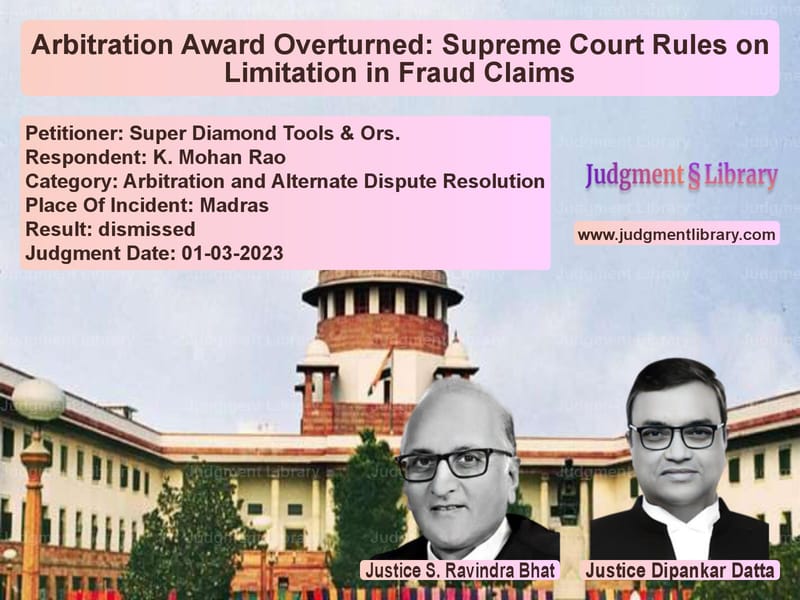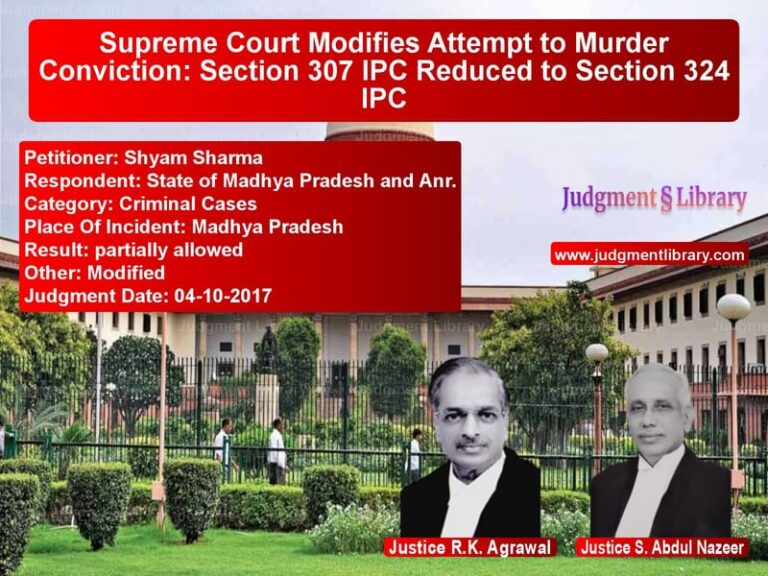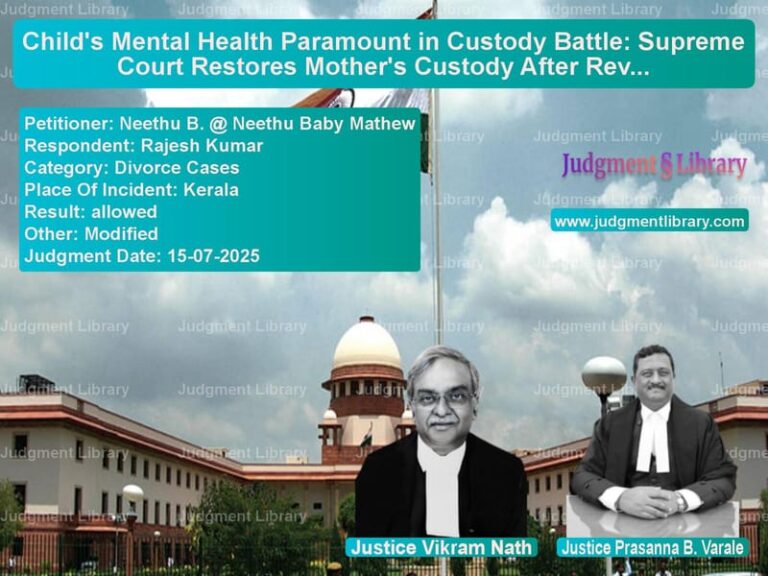Arbitration Award Overturned: Supreme Court Rules on Limitation in Fraud Claims
The Supreme Court of India has delivered a significant judgment in the case of Super Diamond Tools & Ors. v. K. Mohan Rao, shedding light on the application of limitation laws in arbitration disputes involving allegations of fraud. The ruling reinforces the principle that fraud claims must be brought within the legally stipulated timeframe and that delay in raising such claims can render them unenforceable.
The case involved a dispute over partnership accounts, where the appellants alleged that the respondent had engaged in fraudulent financial activities. The arbitration tribunal ruled in favor of the appellants, but the Madras High Court later overturned this decision, citing procedural and substantive lapses in the arbitrator’s findings. The Supreme Court upheld the High Court’s decision, emphasizing that limitation laws cannot be bypassed merely by invoking fraud.
Background of the Case
The dispute originated from financial irregularities in a partnership firm between Super Diamond Tools and K. Mohan Rao. The appellants alleged that the respondent had engaged in over-invoicing and misappropriation of partnership funds, resulting in significant financial losses. The matter was referred to arbitration in 1997, where the arbitrator ruled that the respondent had indeed committed financial misdeeds and directed payment of a sum of ₹53,87,664.40 along with interest.
The respondent, dissatisfied with the arbitral award, challenged it under Section 34 of the Arbitration and Conciliation Act, 1996, which allows courts to set aside arbitration awards that violate public policy. The single judge of the Madras High Court dismissed the petition, upholding the arbitral award. However, the Division Bench overturned the decision, citing that the arbitrator’s methodology was flawed and that the claim was barred by limitation.
Petitioner’s Arguments (Super Diamond Tools & Ors.)
The appellants, represented by R. Anand Padmanabhan, argued that:
- The arbitrator’s findings were based on a thorough review of financial records, including an independent auditor’s report agreed upon by both parties.
- The fraud committed by the respondent was only discovered later, justifying the delay in filing claims.
- Under Section 17 of the Limitation Act, 1963, fraud postpones the limitation period, and since the fraud was detected much later, the claim was valid.
- The respondent’s actions caused financial harm to the partnership, and the arbitrator’s decision should stand.
Respondent’s Arguments (K. Mohan Rao)
The respondent, represented by P. I. Jose, countered with the following points:
- The appellants had knowledge of the alleged fraud as early as 1993 but failed to act promptly.
- The arbitration claim was only made in 1997, and the counterclaim was filed even later in December 1997, well beyond the statutory limitation period.
- The findings of the arbitrator relied on financial records spanning 21 years, making the calculations unreliable and contrary to public policy.
- Section 17 of the Limitation Act does not indefinitely extend the limitation period; rather, it merely postpones it until the fraud is discovered.
Supreme Court’s Judgment
The Supreme Court bench, comprising S. Ravindra Bhat and Dipankar Datta, upheld the Madras High Court’s decision, ruling that the arbitration award was unsustainable due to the lapse of the limitation period. The Court emphasized:
“Section 17 of the Limitation Act does not extend or break the limitation period. It only postpones or defers the limitation period. This is evident from the phrase ‘The period of limitation shall not begin to run.’”
The Court further noted that the appellant had knowledge of the alleged fraud as early as 1993, yet failed to initiate proceedings within the legally prescribed timeframe. The delay of more than three years in filing the counterclaim was deemed unjustifiable.
The judgment clarified that:
- Fraud cannot be used as an indefinite excuse to extend limitation periods.
- Litigants must act diligently in pursuing their legal remedies.
- Arbitration tribunals must ensure that their findings are based on legally tenable principles, particularly when dealing with financial disputes spanning multiple decades.
Implications of the Judgment
This ruling has far-reaching implications for arbitration law and limitation principles in India:
- Businesses and individuals must act promptly upon discovering fraud, as failure to do so may result in the dismissal of claims.
- Arbitration tribunals must carefully assess limitation issues before rendering awards.
- Courts will continue to scrutinize arbitration awards to ensure they align with established legal principles and do not violate public policy.
Conclusion
The Supreme Court’s decision in Super Diamond Tools v. K. Mohan Rao reinforces the importance of adhering to statutory limitation periods, even in cases involving fraud. The ruling serves as a cautionary precedent for litigants, highlighting that delays in pursuing claims can lead to their dismissal, regardless of the merits of the case.
Petitioner Name: Super Diamond Tools & Ors..Respondent Name: K. Mohan Rao.Judgment By: Justice S. Ravindra Bhat, Justice Dipankar Datta.Place Of Incident: Madras.Judgment Date: 01-03-2023.
Don’t miss out on the full details! Download the complete judgment in PDF format below and gain valuable insights instantly!
Download Judgment: super-diamond-tools-vs-k.-mohan-rao-supreme-court-of-india-judgment-dated-01-03-2023.pdf
Directly Download Judgment: Directly download this Judgment
See all petitions in Arbitration Awards
See all petitions in Dispute Resolution Mechanisms
See all petitions in Institutional Arbitration
See all petitions in Enforcement of Awards
See all petitions in Judgment by S Ravindra Bhat
See all petitions in Judgment by Dipankar Datta
See all petitions in dismissed
See all petitions in supreme court of India judgments March 2023
See all petitions in 2023 judgments
See all posts in Arbitration and Alternate Dispute Resolution Category
See all allowed petitions in Arbitration and Alternate Dispute Resolution Category
See all Dismissed petitions in Arbitration and Alternate Dispute Resolution Category
See all partially allowed petitions in Arbitration and Alternate Dispute Resolution Category







